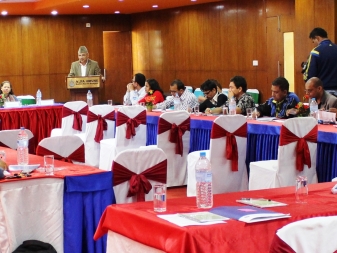Butwal: Stakeholders of the automotive repair and service sector in Rupandehi, including businessmen, mechanics and technicians, among others, recently came together in an interaction conducted by representatives of UNDP’s Support to Knowledge and Lifelong Learning Skills (SKILLS) programme and the Government of Nepal held at an “Auto Village” in Butwal to discuss concerns regarding job prospects in the automobile sector.
At the programme, participants stressed on the need to provide both formal as well as hands-on technical trainings for those involved in automotive repair sector. They maintained that knowledge about the latest technological advancements in the field as well as skills required to use high-tech equipment would lead to more efficiency and customer satisfaction.
Although both governmental as well as non-governmental agencies do offer trainings for auto repair mechanics and those doing denting and painting job from time to time, participants were of the opinion that these were neither regular nor effective enough, making it very difficult for them to maintain a foothold in a rapidly-changing and increasingly-competitive automobile sector.
Mahashram Sharma, a member of the policy dialogue team—comprising representatives of the Ministry of Education, Council for Technical Education and Vocational Training (CTEVT), SKILLS and TVET experts—noted the high prevalence of unskilled or semi-skilled mechanics and technicians in the field who are not able to provide the kind of services demanded by the market. “The government needs to come up with programs to produce more skilled workers who are adept in using the latest technology,” he said.
These concerns need to be reflected in the Technical and Vocational Education and Training (TVET) Policy 2012, participants agreed, if the country was to have any hope of retaining highly- and even semi-skilled human resources in the sector, rather than losing workers to overseas employment as per the current trend.
Santosh Pandey, President of Butwal Auto Engineering Association, admitted that even the private sector has not been able to give auto mechanics relevant upskilling opportunities at a time when technologically-advanced foreign vehicles have arrived in the market. This, according to him, has proven an obstacle not just for auto-mechanics, but also businessmen and other investors in the field at large.
More efforts geared towards establishing mentorship and learning options to help entrepreneurs and workers expand the scope of their businesses was among the solutions proposed during the interaction. There were also calls to let automotive dealers, mechanics and entrepreneurs make use of unused government land in an effort to provide high-quality services from a single place.

